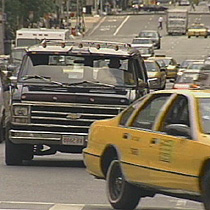2007年VOA标准英语-Big City Mayors Promote Congestion Tax(在线收听)
London
07 June 2007
When big city mayors, business leaders, and environmentalists gathered recently in New York City to discuss climate change, at the heart of their talks was the effects of carbon emissions on the environment. Paige Kollock reports on what cities plan to do about it.
The mayors stood under the blazing sun in Central Park and vowed to take a stand, to make their cities greener, with or without the help of their national governments.
“We are united in the determination to meet the challenge of climate change,” said New York Mayor Michael Bloomberg.
 |
London already has a similar tax. Since 2003, British drivers have had to pay the equivalent of about $16 to enter downtown London.
Ken Livingstone is the mayor of London. He wants to expand the program to the outer boroughs because it has worked so well in the city's center.
“Forty six percent of the journeys in London were by car,” he explained. “Today that's down to 42. And that's shifted 20 percent reduction of carbon dioxide emissions in the central zone, reductions of nitrous oxides, in particular, of over 10 percent.”
Bloomberg's plan would charge $8 to enter Manhattan between the hours of six in the morning and six at night. Trucks would pay $21.
A random sampling of New Yorkers found little enthusiasm for the scheme. “I think it's a horrible thing to put more stress on hard-working Americans who pay their taxes,” said one. “We pay the most taxes in the whole country -- this state.”
“I'd become very poor, very quickly,” said another driver. “That's all I do is drive, and cabs are expensive, but there does have to be a resolution to the congestion problem.”
Transportation Alternatives is a non-profit group that promotes biking, walking and public transportation. It says a congestion tax is the solution. Under Mayor Bloomberg's proposal, the estimated $31 billion made from the congestion tax over three years, would go to improving public transportation. Paul Steely White is the executive director of Transportation Alternatives.
“Even for those who will pay the charge, they're going to get a benefit, in terms of a quicker commute. If you're a construction worker or a plumber or an electrician, your day is going to be more efficient, squeezing in another job or two,” says White.
But some New Yorkers think they will need those extra jobs because consumer prices will go up.
“I'd have to charge my customers more money, which ultimately becomes a vicious cycle,” says one citizen. “I'm in the antique business, and so if I get charged more money, I'm going to have to charge them more money. In the end, everybody pays for it.”
Like London, Singapore and Stockholm have already incorporated traffic pricing plans. But some of the famously quarrelsome citizens of this metropolis may shout it down.